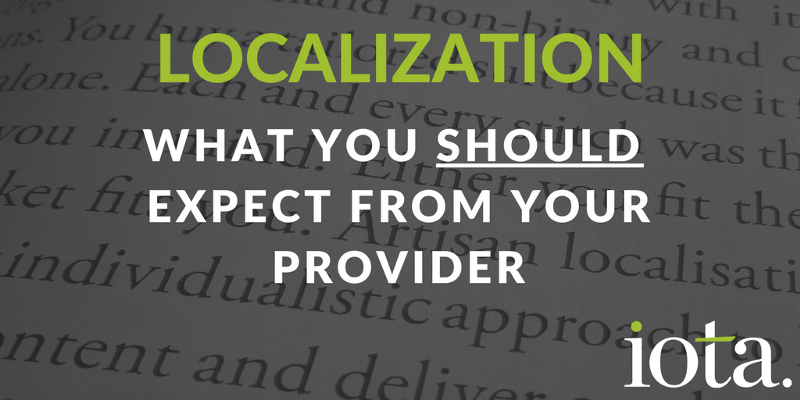Are your expectations high enough?
Every buyer of localization services has their own expectations. I’m sure you do too — whether you represent a young software business just starting out, or an enterprise player with an established international presence.
What I find surprising is just how low some of these expectations are.
I see this as a failure of the localization industry.
Maybe it comes down to a homogenised approach. Maybe it’s lazy complacency. Maybe some localization providers are only really interested in their top five clients.
It may be that the industry gets away with it as buyers simply accept it as ‘the norm’.
They shouldn’t.
Which leads me to the main point of this article — what should you expect?
In my view, whatever size your business is, and whatever stage of international development you’re at, you should expect the following from a true localization partner:
1. If you’re using an existing translation tool, and you’d like to continue to manage your internal workflow in this way, it should be an option. You shouldn’t be forced into using a prescribed process or tool just because it’s easier for your localization company to work that way.
2. You should have easy direct access to your partners’ leadership team, project managers, and software engineers. If you want to talk to the people actually doing the work and not just a faceless account manager — you should be able to.
3. Whilst every business has some degree of staff turnover, you should expect stability amongst the team working on your project. Frequent staff changes lead to delays, misunderstandings, and lengthy periods of getting the team back up to speed. High levels of employee churn can also be an indication of more deep-seated problems.
4. You should expect your localization provider to take the time to genuinely understand what you’re trying to achieve at a strategic level.
5. You should expect them to provide expert guidance and advicebased on their own experience and that of their wider network. You shouldn’t expect to be charged tens of thousands in consultancy fees for bringing ideas and suggestions to the table.
6. You should expect your localization provider to be as keen to learnas you are. New technologies, new applications, and new possibilities are coming at an astonishing pace. If you’re introducing something new that might present a localization challenge, your provider should welcome and embrace this — and work with you to develop a solution.
7. If you’ve got very specific requirements when it comes to handling XML files, customised mapping, or any other quirk that’s unique to your product, that shouldn’t be a problem. You should expect your provider to be flexible and willing to adapt to your needs wherever possible.
8. You should expect fair and competitive pricing. The best localization providers don’t do cheap. The worst ones do, and it’s you who’ll pay for it in the long run.
9. Your localization partner should expect the unexpected. And deal with it. That’s the nature of today’s fast-moving technology industry. Priorities change, deadlines change, and requirements change — your provider should expect this, anticipate it where possible, and work with you to mitigate any effect it may have on your budget or timeline.
10. Finally, you should expect no bullshit. It’s a crude way of putting it, but a long term relationship based on honesty, transparency, and respect is the least you should expect.
I’d love to know if you think I’ve missed anything. Get in touch directly, leave a comment below, or tweet @iotals if you have different expectations or your own localization experiences to share…



